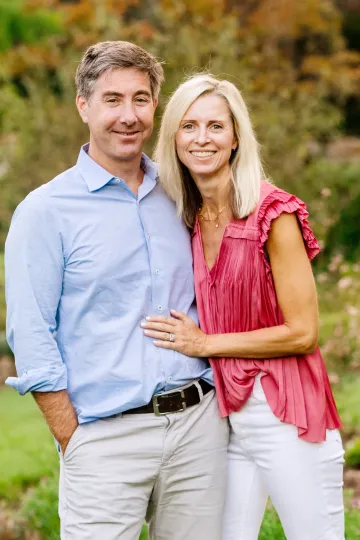Boosting Nursing Education Tech
Andrew ’98 and Kirsten Braccia ’98 have made a $1.5 million gift to support students in the College of Nursing, COVID-19 initiatives and student-athletes whose eligibility has been extended.
The largest portion of the Braccias’ gift, $1 million, is being used by the College of Nursing to enhance both remote and in-person learning.

Andrew and Kirsten Braccia / photo courtesy of the Braccias
Kirsten Braccia graduated from the College of Nursing and worked as a registered nurse at the Lucile Packard Children’s Hospital on the Stanford University campus. Andrew Braccia, an alumnus of the Eller College of Management, is a venture capitalist with Accel Partners.
“I am so grateful to Andrew and Kirsten for their generosity and for being outstanding examples of what it means to be a Wildcat for Life,” says Robert C. Robbins, University of Arizona president. “Their partnership will have a huge impact in the lives of our nursing students as they transition to remote learning, which in turn will support the health and well-being of the many communities we serve.”
The Braccias directed $200,000 of the gift to the president’s COVID-19 Testing, Research and Re-entry Fund. Their gift is helping fund the test, trace and treat strategy across campus, which is allowing for some in-person learning this semester through a phased approach based on careful monitoring of test results and other public health metrics.
Another $300,000 of the Braccias’ gift goes to Arizona Athletics, where it will be used to fund scholarships for “super seniors,” the student-athletes who were granted another season of eligibility after being unable to compete in spring 2020.
The College of Nursing is using the gift to enhance simulation-based learning capabilities at the Tucson, Phoenix and Gilbert campuses, and to purchase software that students can use remotely.
“Through the Braccias’ generous gift, we were able to purchase virtual and web-based simulation platforms and equipment that made it possible for students to experience realistic patient scenarios when they were not able to come to campus or attend in-person clinical rotations,” says Dean Ki Moore.
Purchases made as a result of the gift are many and broad-based. For remote learning, software enhancements are giving students opportunities to practice their skills through virtual patient encounters designed to supplement or replace experiences in a simulation center or patient-care setting. Live online telehealth encounters using standardized patients have also allowed students to practice clinical skills. Video production kits are helpful for faculty to produce skills-training demonstrations, and audiovisual equipment supports remote access to classroom sessions for students who need to isolate after returning to campus.
Procurement of additional simulation equipment and supplies has increased capacity both in remote environments and on campus. Live remote monitoring and video capture of simulation activities enhances debriefs and student learning.
For in-person learning, reconfiguring space and audiovisual technology across all three campuses has allowed safe, in-person skills training. At the college’s new Gilbert campus, funds will be used to expand and improve functionality within its simulation rooms to support program growth. In addition, both the Phoenix Biomedical and Gilbert campuses will receive new high-fidelity pediatric manikins.
“We are honored to partner with the Braccias as we advance the college as a leader in innovative technologies,” says Moore.
